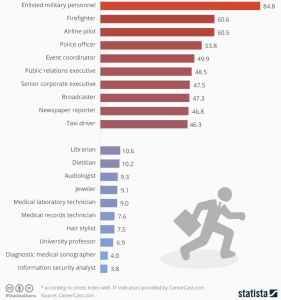Could something unusual be happening in organizations today?
Are Americans looking to beat the stress they have in their jobs by voluntarily moving themselves into roles that are less demanding?
Could this lead to fewer people wanting demanding jobs?
According to career coach Jasmine Escalera, and career expert at MyPerfectResume, there’s mounting evidence this trend is indeed happening.
The practice of staff choosing to demote themselves into a less stressful jobs is something she’s calling ‘career downsizing’.
Not only does Escalera say it’s happening, but she argues the trend is reflective of what data from The American Institute of Stress (and others) have been saying for some time – that a shocking 83% of US workers now say they suffer from work-related stress, with 25% saying their job is the number one stressor in their lives.
She says career downsizing is effectively staff saying ‘enough is enough’ – and that in the absence of good HR to make their existing jobs more manageable, they’re having to take last-ditch measures, and put control into their own hands.
So how widespread is this trend really?
And, more than this, is this latest talent headache a worrying one for HR professionals to contend with – having staff that just don’t want to move up anymore, and active want to move down?
TLNT decided to sit down with Jasmine to hear her thoughts:
Q: I’ve heard of people wanting to climb the career ladder – but people who actively want to come down the ladder – that’s a new one to me. Please do explain!
A: “When I first started my career, concepts such as ‘toxic workplaces’ and ‘unhealthy workplaces’ weren’t really things we actively thought about. But now, I sense workers are so flooded with expectations of what a good workplace ought to be, and what good workplaces ought to provide, that people are much more aware of the fact they might be in overly-pressurized or overly-stressed at work, or not able to be their authentic self. At the same time, people are assessing how their life is impacted by their work more, and how they can make their work and life fit better together. The upshot, is that this is all adding up to people actively considering career downsizing, as a way of them being able to facilitate a better working life.”
Q: We keep hearing that people are still financially pressed, but are you saying that people – despite this – would still take a pay cut rather than be too stressed?
A: “For some, career downsizing clearly isn’t an option, but we’re seeing a trend for more people willing to take a cut financially, and stepping back career-wise, if it means they have less stress and less anxiety in the workplace. There’s a real sense that people are having moments of reflection, and asking what the meaning of life is. While it’s still the case that for younger people, it’s all about how far they can go up the ladder, for mid-career individuals, we’re seeing greater willingness to trade pay for better balance and stability.”
Q: Are you seeing people actively ‘not’ taking promotions, and isn’t this bad news for HR folk who instinctively want to move people up?
A: “We do see people unwilling to take a promotion, and we certainly see more people asking about the impact a promotion might have on their life. Job seekers, or those already in jobs are definitely being conscientious about whether they want to move up, and whether the extra reward is worth the extra stress they believe this will entail. We’re even seeing reticence amongst people to take stretch roles – those jobs that typically involve a bit of extra personal pain for people to see that they can do something they thought they coudn’t. For HR folk, this is unusual territory, as now they’re having to battle antipathy to move up – something that they could have taken for granted.”
Q: Is this a poor reflection on HR, if people are taking this drastic move, and could it see companies experience shortages of people who want to ‘step up’?
A: “Yes, and lack of a cohort wanting to move up – because they’re seeing the level above them want to move down – is is a very real problem that we could see getting worse. HR might well have to enter into additional conversations around offering flexibility in order to persuade people that a role isn’t as stressful as they think, or that they will be given support if they do find it stressful. If people are unwilling to step up, what HR professionals might also have to do is be much more forensic about planning what skills they need and what the organizational structure needs to be. If people aren’t taking promotions, HR has to react to it somehow.”
Q: What could be another impact of this?
A: “We’re already seeing people who are just turning up to work, doing their bare minimum hours, and refusing to enter into anything that creates more workload and stress. This will continue. But I also think we’ll continue to see the rise in people exploring the side-hustle more and people deciding to become their own solopreneur. When people aren’t fully focused on their careers anymore, or don’t want to move up to the next level, you always see a spike in people wanting to work for themselves.”
Most and least stressful jobs in the US

